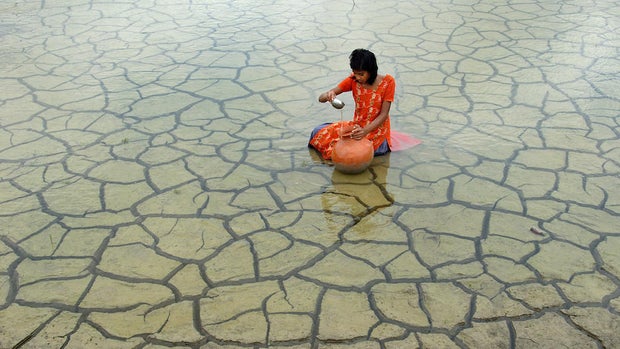Human civilization faces "existential risk" by 2050 according to new Australian climate change report
/ CBS NEWS
A new report by Australian climate experts warns that "climate change now represents a near- to mid-term existential threat" to human civilization. In this grim forecast — which was endorsed by the former chief of the Australian Defense Force — human civilization could end by 2050 due to the destabilizing societal and environmental factors caused by a rapidly warming planet.
The report, entitled "Existential climate-related security risk: A scenario approach," lays out a future where society could collapse due to instability set off by migration patterns of billions of people affected by drought, rising sea levels, and environmental destruction.
"Climate-change impacts on food and water systems, declining crop yields and rising food prices driven by drought, wildfire and harvest failures have already become catalysts for social breakdown and conflict across the Middle East, the Maghreb and the Sahel, contributing to the European migration crisis," the report said.
The report was written by David Spratt, research director for Breakthrough National Centre for Climate Restoration in Melbourne, and Ian T. Dunlop, formerly an international oil, gas and coal industry executive and chair of the Australian Coal Association. Retired Admiral Chris Barrie, former defense forces chief of Australia, endorsed the report and wrote a forward to it.
"After nuclear war, human induced global warming is the greatest threat to human life on the planet," Barrie wrote.
Using a worst-case scenario existential risk analysis, Spratt and Dunlop depict humanity falling into ruin under an additional 2 degrees Celsius of warming — a threshold scientists say the world is heading towards if current trends continue. In their scenario, "tipping points" occur when humanity fails to institute carbon emission reforms in the 2020s and 2030s. This creates a "hothouse" effect on Earth, leading to rapidly rising sea levels set off by melting of the Greenland Ice Sheet and "widespread permafrost loss and large-scale Amazon drought and dieback."
In this scenario, the "hothouse Earth" effect causes "35 percent of the global land area, and 55 percent of the global population, (to be) subject to more than 20 days a year of lethal heat conditions, beyond the threshold of human survivability." Ecosystems collapse, including coral reef systems, the Amazon rainforest and the Arctic, along with a massive die-off of the insect population.
The report also paints a grim picture in terms of national security, with extreme climate conditions and the disruption of huge populations placing "the internal cohesion of nations ... under great stress." "The flooding of coastal communities around the world, especially in the Netherlands, the United States, South Asia, and China, has the potential to challenge regional and even national identities," the report warns. "Armed conflict between nations over resources, such as the Nile and its tributaries, is likely and nuclear war is possible. The social consequences range from increased religious fervor to outright chaos."
Spratt and Dunlop do offer some solutions. They point to the national security sectors of the world's major powers and argue they could pay a unique role in mobilizing society, similar in scale to the emergency response World War II required of people and governments in the 1940s.
"To reduce such risks and to sustain human civilization, it is essential to build a zero emissions industrial system very quickly. This requires the global mobilization of resources on an emergency basis, akin to a wartime level of response," the report reads. "The national security sector has unrivaled experience and capacity in such mobilization, and can play a unique role in its development and implementation, as well as educating policymakers of the existential security risks in failing to do so."





Geen opmerkingen:
Een reactie posten